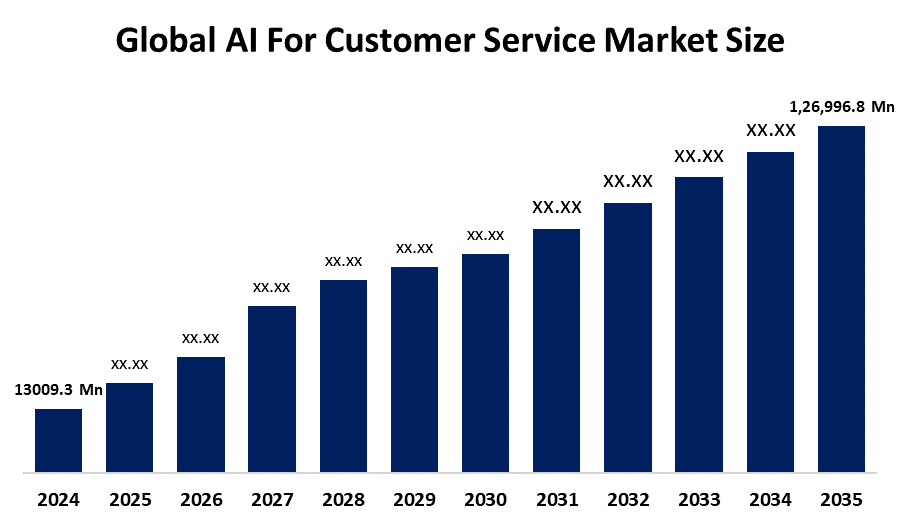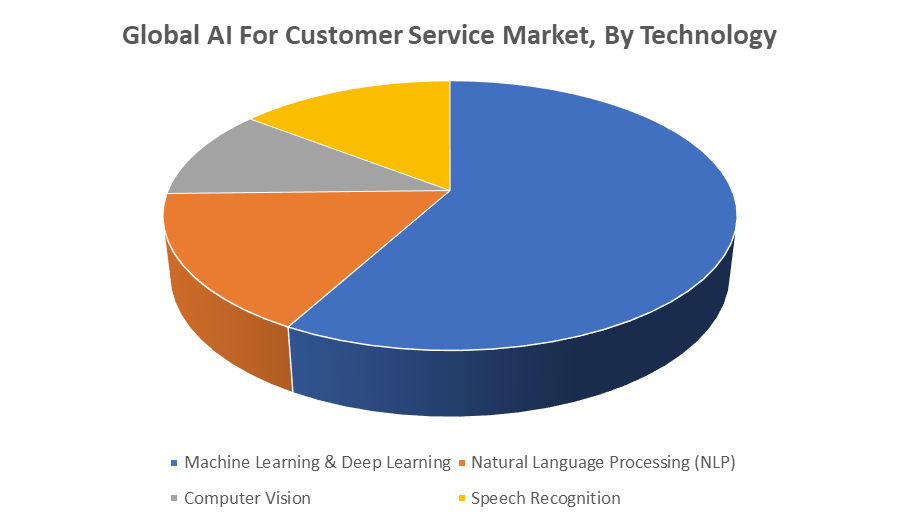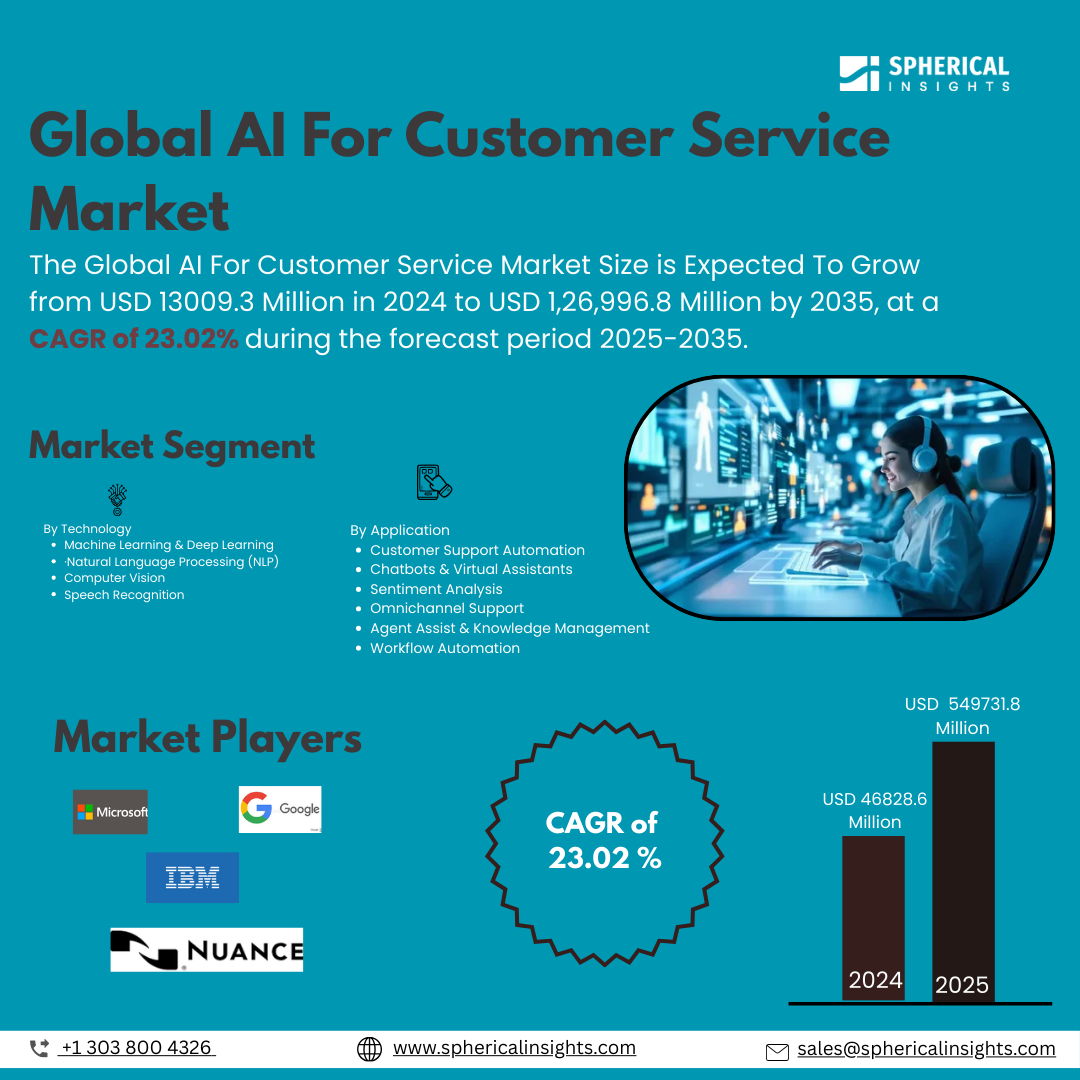Global AI For Customer Service Market Insights Forecasts to 2035
- The Global AI For Customer Service Market Size Was Estimated at USD 13009.3 Million in 2024
- The Market Size is Expected to Grow at a CAGR of around 23.02% from 2025 to 2035
- The Worldwide AI For Customer Service Market Size is Expected to Reach USD 1,26,996.8 Million by 2035
- Asia Pacific is expected to grow the fastest during the forecast period.

AI For Customer Service Market
The AI for Customer Service Market Size refers to the use of artificial intelligence technologies to improve and automate customer support interactions. This includes tools such as chatbots, virtual assistants, natural language processing (NLP), sentiment analysis, and machine learning algorithms that enhance responsiveness, accuracy, and efficiency in customer service operations. AI solutions enable businesses to deliver faster, more personalized, and consistent support across multiple channels, including websites, mobile apps, social media, and voice platforms. These technologies can handle routine inquiries, escalate complex issues to human agents, and provide real-time insights into customer behavior and service quality. As companies strive to improve customer satisfaction and reduce operational costs, AI-driven platforms are becoming integral to service strategies across various industries, including retail, banking, healthcare, and telecommunications. The market is experiencing strong growth as more organizations integrate AI into their customer experience workflows to optimize performance and deliver seamless, on-demand support.
Attractive Opportunities in the AI For Customer Service Market
- AI enables delivering uniquely tailored customer experiences based on individual behavior, preferences, and history. This goes beyond basic automation to create deeper engagement and satisfaction, helping businesses stand out by offering highly relevant, context-aware support.
- AI can identify potential customer issues before they escalate, allowing businesses to proactively resolve problems. This predictive capability improves customer loyalty and satisfaction by minimizing disruptions and demonstrating attentiveness.
- Real-time AI-driven translation and multilingual support open doors for companies to serve diverse global audiences without expanding human teams. This capability allows businesses to tap into new markets efficiently, supporting growth and inclusivity.
Global AI For Customer Service Market Dynamics
DRIVER: Advancements in technologies such as natural language processing
Advancements in technologies such as natural language processing, machine learning, and generative AI have made it possible for AI tools to deliver more accurate and human-like customer interactions. Businesses are increasingly adopting these solutions to enhance efficiency, reduce operational costs, and improve agent productivity by automating routine inquiries and supporting agents with intelligent tools. Additionally, there is a rising demand for faster, personalized, and 24/7 support from customers, which AI enables through features like chatbots, virtual assistants, and omnichannel service capabilities. AI also improves customer experiences by offering predictive insights, sentiment-aware interactions, and intelligent routing to the most suitable support channels or agents. The growing availability of cloud-based solutions further supports widespread adoption, and digital transformation efforts, particularly in emerging markets, are accelerating the integration of AI across various customer service platforms.
RESTRAINT: Lack of emotional intelligence in AI systems
The adoption of AI in customer service, while promising, is restrained by several critical challenges. One major issue is the lack of emotional intelligence in AI systems, which makes it difficult for them to handle nuanced or sensitive customer interactions effectively. This often leads to dissatisfaction when empathy or personalized judgment is required. Additionally, AI tools can struggle with non-standard or complex queries, forcing businesses to rely on human agents for resolution, undermining automation goals. High implementation costs, including infrastructure, integration, and skilled workforce requirements, pose another barrier, especially for smaller organizations. In many cases, poor data quality and outdated legacy systems hinder the performance and scalability of AI solutions. Resistance to change is also common: employees may fear job displacement, while customers may be skeptical of algorithm-driven decisions due to a lack of transparency. Furthermore, regulatory uncertainty, ethical concerns, and difficulty in measuring long-term ROI create hesitation around broader enterprise-level adoption.
OPPORTUNITY: AI opens avenues for predictive and preventative service
While driving factors push adoption, unique opportunities in AI for customer service lie in emerging trends and untapped areas of innovation. One key opportunity is hyper-personalization, using AI to deliver uniquely tailored interactions based on individual behavior, preferences, and history, beyond basic automation. AI also opens avenues for predictive and preventative service, where customer issues are identified and resolved before they escalate, improving satisfaction and loyalty. Multilingual support through real-time translation offers businesses access to global markets without expanding human teams. Additionally, AI-driven analytics provide deeper insights into customer sentiment and journey mapping, enabling smarter strategy development. As generative AI matures, it can support dynamic content creation for FAQs, emails, and self-service portals, reducing manual workloads. The rise of voice AI and integration with IoT devices further expands the service experience across new platforms. These opportunities, while still developing, have the potential to redefine customer engagement models across industries.
CHALLENGES: Ensuring consistent and context-aware responses across different channels
One major challenge is ensuring consistent and context-aware responses across different channels and touchpoints, which requires sophisticated training data and ongoing model refinement. Maintaining data privacy and complying with evolving regulations like GDPR or local AI laws adds operational complexity, especially for global companies. Another challenge is achieving seamless human-AI collaboration; poor handoffs between bots and human agents can disrupt service quality. Training and upskilling employees to work effectively with AI tools is also demanding, especially when change management is lacking. Furthermore, monitoring AI systems for bias, accuracy, and fairness requires constant oversight and technical expertise. As customer expectations evolve, AI systems must adapt quickly, which can be difficult without flexible architectures. These challenges require long-term strategic planning, not just technical investment, to ensure sustainable and effective AI-driven customer service.
Global AI For Customer Service Market Ecosystem Analysis
The global AI for customer service ecosystem includes key technology providers like cloud giants and AI startups delivering NLP, machine learning, and chatbot solutions. System integrators and consultants customize and implement these tools for businesses across sectors such as retail, banking, and healthcare. Data providers supply training datasets, while third-party platforms offer APIs for translation and sentiment analysis. Regulatory bodies ensure compliance with privacy and ethical standards. Together, these players create a collaborative environment that drives AI innovation and adoption in customer service worldwide.
Based on the technology, the machine learning & deep learning segment led the market with the leading revenue share over the forecast period

The segment dominance is driven by their ability to enable more accurate data analysis, natural language understanding, and improved predictive capabilities, which enhance customer service efficiency and personalization. These technologies power advanced AI applications such as intelligent chatbots, virtual assistants, and automated issue resolution, making them the preferred choice for businesses aiming to deliver seamless and responsive customer experiences.
Based on the application, the chatbots & virtual assistants segment led the market with the major revenue share during the forecast period
The chatbots and virtual assistants segment led the market, holding the largest revenue share during the forecast period. Their widespread adoption is due to their ability to provide instant, 24/7 customer support, handle routine queries efficiently, and reduce operational costs. These AI-powered tools enhance customer engagement by delivering personalized, real-time interactions across multiple channels, making them a critical component for businesses aiming to improve service quality and customer satisfaction.
North America is anticipated to hold the largest market share of the AI for customer service market during the forecast period
North America is anticipated to hold the largest market share in the AI for customer service market during the forecast period. This is attributed to the region’s advanced technological infrastructure, strong presence of major AI and cloud service providers, and high adoption rates of innovative customer service solutions. Additionally, businesses in North America prioritize enhancing customer experience and operational efficiency, driving significant investments in AI technologies. Supportive government policies and a mature digital ecosystem further contribute to the region’s market leadership.
Asia Pacific is expected to grow at the fastest CAGR in the AI for customer service market during the forecast period
Asia Pacific is expected to grow at the fastest CAGR in the AI for customer service market during the forecast period. Rapid digital transformation, increasing internet penetration, and the expansion of e-commerce and telecommunications sectors are fueling this growth. Additionally, rising adoption of AI technologies by small and medium-sized enterprises, coupled with supportive government initiatives, is driving market expansion. The region’s large and diverse customer base creates strong demand for AI-powered, multilingual, and scalable customer service solutions, making it a key growth hotspot.
Recent Development
Key Market Players
KEY PLAYERS IN THE AI FOR CUSTOMER SERVICE MARKET INCLUDE
- Microsoft Corporation
- IBM Corporation
- Google LLC
- Amazon Web Services (AWS)
- Salesforce
- Nuance Communications
- SAP SE
- LivePerson Inc.
- Zendesk Inc.
- Cisco Systems
- Others
Market Segment
This study forecasts revenue at global, regional, and country levels from 2020 to 2035. Spherical Insights has segmented the AI for customer service market based on the below-mentioned segments:
Global AI For Customer Service Market, By Technology
- Machine Learning & Deep Learning
- Natural Language Processing (NLP)
- Computer Vision
- Speech Recognition
Global AI For Customer Service Market, By Application
- Customer Support Automation
- Chatbots & Virtual Assistants
- Sentiment Analysis
- Omnichannel Support
- Agent Assist & Knowledge Management
- Workflow Automation
Global AI For Customer Service Market, By Regional Analysis
- North America
- Europe
- Germany
- UK
- France
- Italy
- Spain
- Russia
- Rest of Europe
- Asia Pacific
- China
- Japan
- India
- South Korea
- Australia
- Rest of Asia Pacific
- South America
- Brazil
- Argentina
- Rest of South America
- Middle East & Africa
- UAE
- Saudi Arabia
- Qatar
- South Africa
- Rest of the Middle East & Africa





